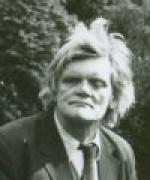So C is down with a cold, I am finishing off the Liverpool University Kenneth Allott lecture - just actually finished a decent draft, to be revised - and trying to draw a cover picture for Shuck, Hick, Tiffey, the Gatehouse Press book of three regional libretti I wrote for composer Ken Crandell. Waiting for me, pressingly, the talk on Zbigniew Herbert in Cracow and the conversation in Frankfurt, for which I am reading - as best I can - two books by Cecile Wajsbrot, with whom I am to have said conversation. Never mind UEA and external examining, the correspondence, the writing of references etc, and - of course - the translations, on which some further progress.
In the course of the Kenneth Allott lecture, which is about such versions of English sensibility as a foreign poet might, just, be able to enter,I refer to this poem by John Heath Stubbs:
Epitaph
MR. HEATH-STUBBS as you must understand
Came of a gentleman's family out of Staffordshire
Of as good blood as any in England
But he was wall-eyed and his legs too spare.
His elbows and finger-joints could bend more ways than one
And in frosty weather would creak audibly
As to delight his friends he would give demonstration
Which he might have done in public for a small fee.
Amongst the more learned persons of his time
Having had his schooling in the University of Oxford
In Anglo-Saxon Latin ornithology and crime
Yet after four years he was finally not preferred.
Orthodox in beliefs as following the English Church
Barring some heresies he would have for recreation
Yet too often left these sound principles (as I am told) in the lurch
Being troubled with idleness, lechery, pride and dissipation.
In his youth he would compose poems in prose and verse
In a classical romantic manner which was pastoral
To which the best judges of the Age were not averse
And the public also but his profit was not financial.
Now having outlived his friends and most of his reputation
He is content to take his rest under these stones and grass
Not expecting but hoping that the Resurrection
Will not catch him unawares whenever it takes place.
This has a great many keynote Englishisms. First the self-deprecation that is also a modest aristocratic brag. Second, the mocking of the poet's own bodily grace; third the schoolboy joke about creaky finger joints; fourth, the making light of education while letting us know there has actually been a rather high-class education; fifth, the arch joke about the Anglican religion; sixth, the gentleman-amateur quip about his own status as a poet that includes a learned literary reference; seventh, the mock-Augustinianisms and quaint lapidary phrasing in which this is conveyed (perfectly appropriate for an engraved, albeit long, epitaph, as imagined being spoken by someone else) and, eighth, trumping the lot at the end, one splendid double-negative.
It is irony at its warmest, a joke against pomposity in mock pompous language, a dismissing of everything thought to be just too too serious. A double negative working at double negative level. One is, one might say, not unamused. I don't think the poem could have been written by anyone but an Englishman of a certain class letting his hair down.
I have long loved the poem, the persona speaking it, and the guessed-at real person behind the persona. Because I did meet John Heath-Stubbs a few times, but he, being blind, only met my voice and my opinion of one of his books, an opinion that pleased him. He looked, in fact, a little like Lurch, the butler in the Addams family, big and heavy browed and raggedly dressed as though he had spent years sleeping under the stairs. Not being able to see anything he recited his poems from memory. A friend would adjust him so he was facing the audience, but he would - deliberately, I like to think - reposition himself so as to turn round and away by some forty-five degrees, his blind eyes looking somewhere into the top corner of the room.


2 comments:
What a lovely piece, George. Thank you.
OS.
What a beautiful snapshot - the words and the photo.
Best of luck with the forthcoming lecture in Liverpool. My mum, 88, lives in Runcorn.
Should some impresario, perhaps Ken Dodd, 81, offer you a writing job, just say that you work 'for Cunard' (Scouse humour).
Post a Comment